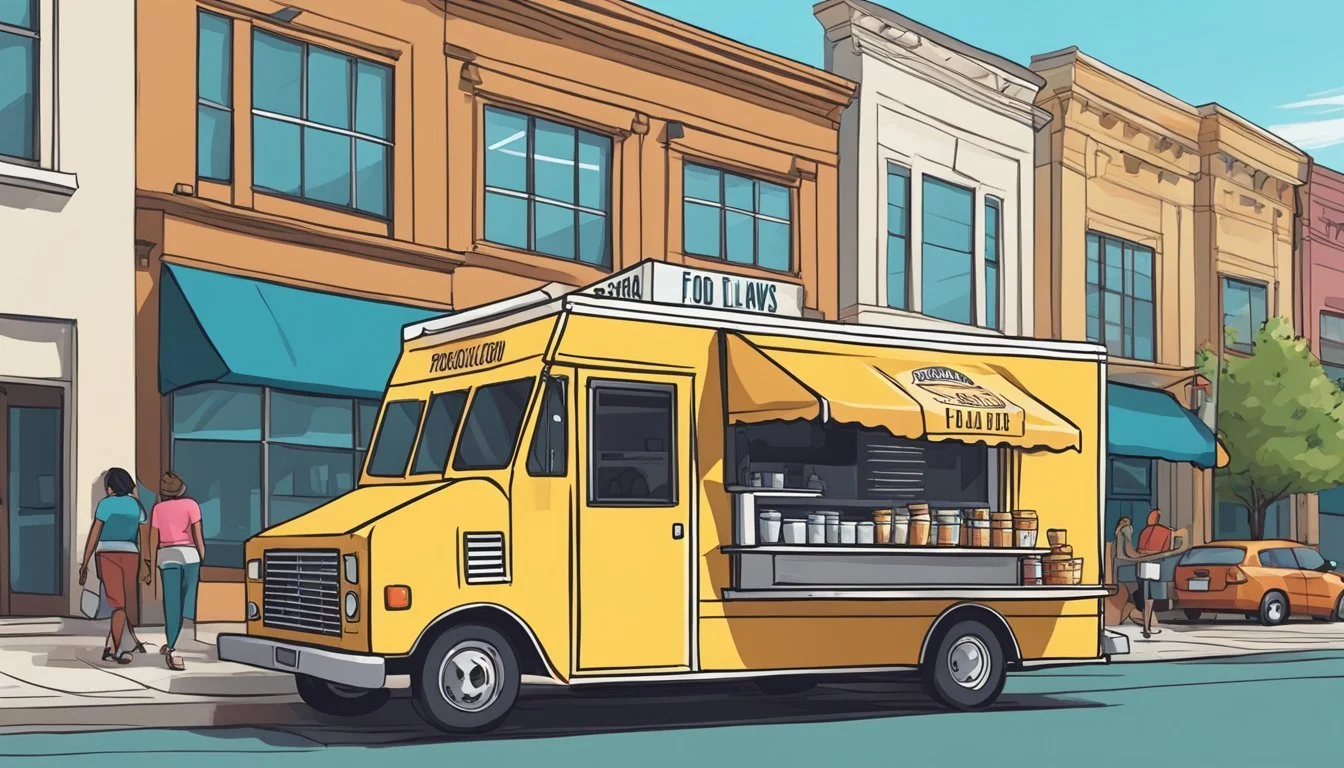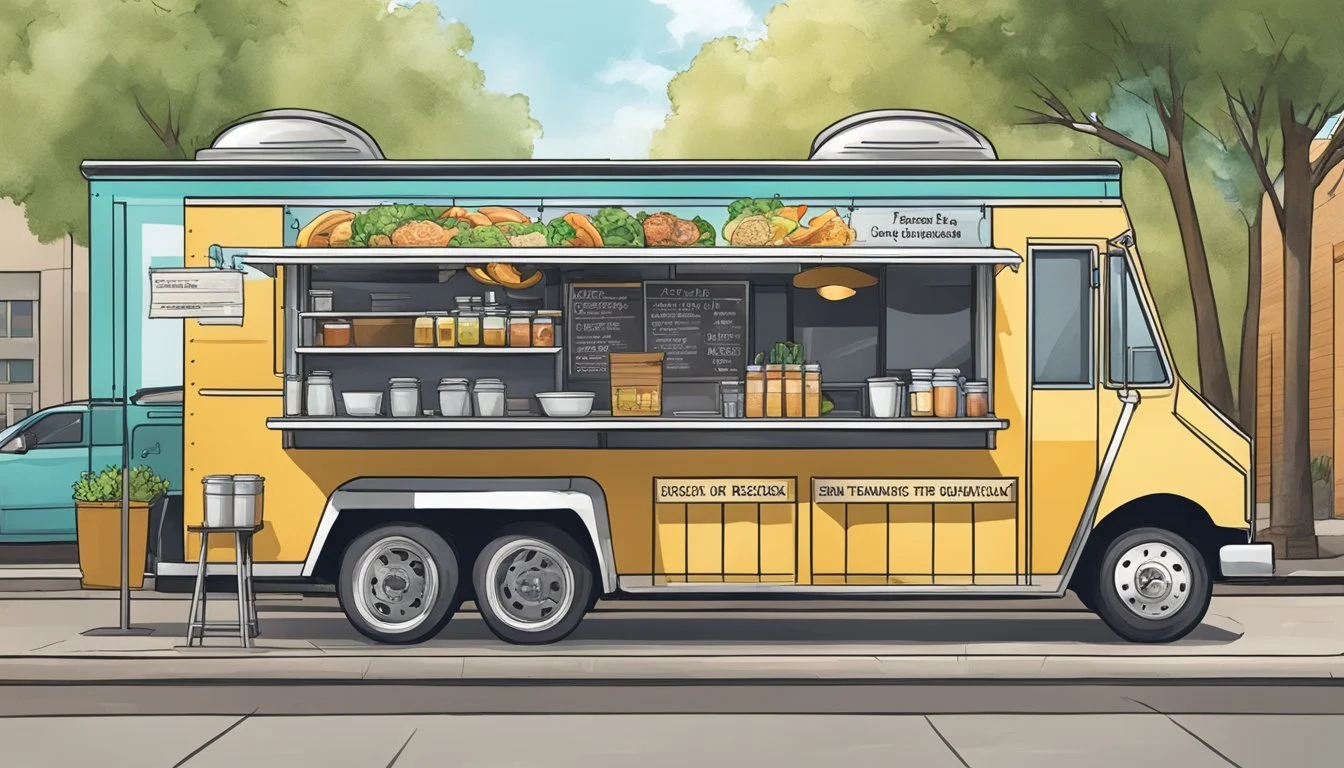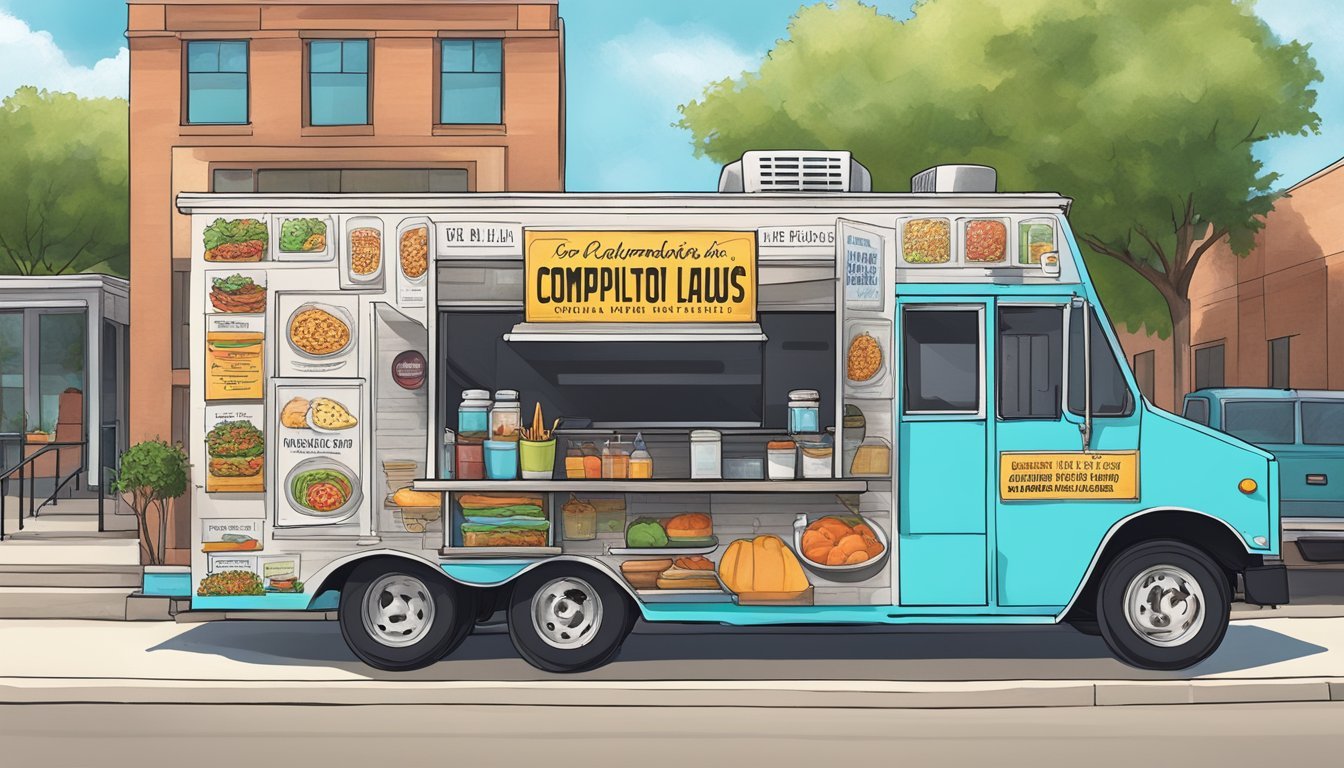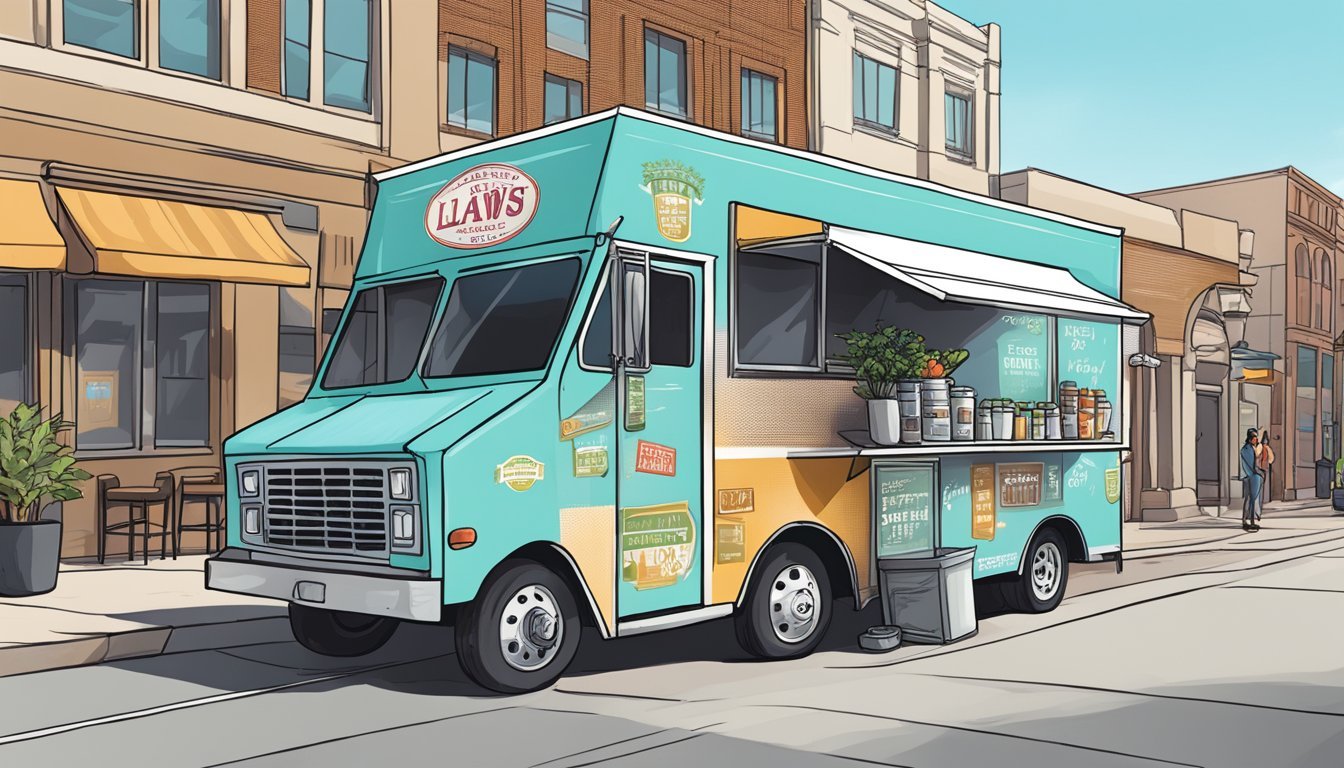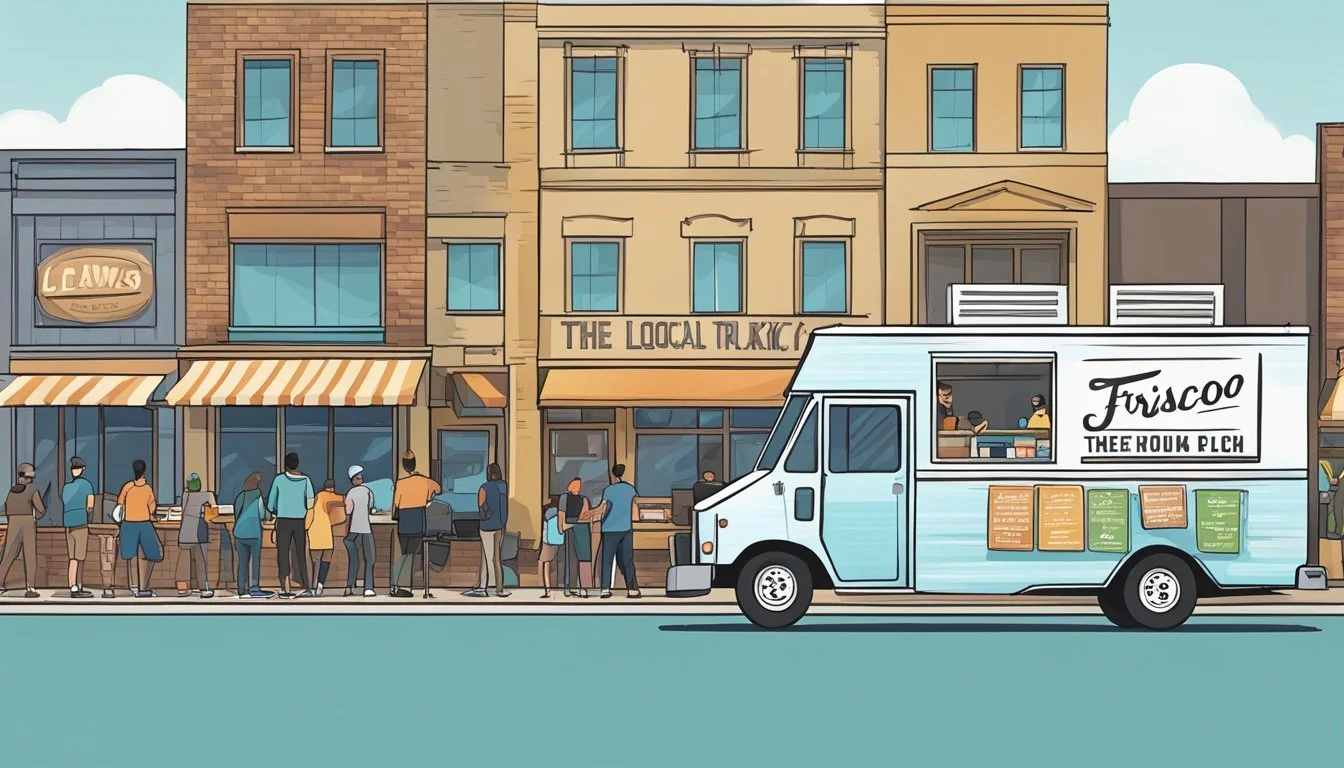Food Truck Laws Frisco, Texas
Navigating Regulations for Street Food Vendors
Operating a food truck in Frisco, Texas, requires navigating various regulations designed to ensure public health and safety. These laws are established by the city to maintain high standards for mobile food vendors. A food truck in Frisco is defined as a mobile food unit that is allowed to operate at an approved location for a period of time exceeding fifteen minutes. Entrepreneurs in the mobile food industry must be mindful of the legalities to comply with municipal requirements and provide service without interruptions.
Before hitting the streets of Frisco, food trucks must secure several permits and inspections, demonstrating adherence to health codes and safety standards. Permits are a crucial part of this process, with the city stipulating that they are valid for one year, and the associated location fee is set at $400. This structured approach by Frisco's regulatory framework serves to balance the city's support for economic vitality and its commitment to protect the welfare of its residents and visitors.
A prospective or current food truck owner in Frisco must be aware of the permitted locations, operational time frames, and the intricacies of health and safety requirements that the city enforces. The city's official website offers resources and pertinent information on mobile and temporary food vendor guidelines, which is essential for the smooth operation of mobile food services. Compliance with these standards safeguards not only the consumer but also food truck operators, fostering a thriving food service landscape in Frisco.
Understanding Food Truck Regulations in Frisco
In Frisco, Texas, food truck operators must navigate a series of specific regulations, obtain necessary permits, and adhere to stringent health and safety requirements. These measures ensure that food service is conducted safely and in accordance with local laws.
Food Truck Operation Standards
Food trucks in Frisco are defined as mobile food units that can operate in approved locations for periods exceeding fifteen minutes. The city's regulations require that each food truck has proper zoning clearance and adheres to set operational standards. Depending on the location and the type of food service, different standards might apply. For instance, food truck courts on non-residential property are subject to particular provisions.
Permitting Process
Operators looking to obtain a permit must apply through the Frisco, Texas Official Website. A permit's validity is typically one year, with fees per location standing at $400. To secure a permit, food truck owners must submit an electronic review and adhere to the mandatory inspection process, which ensures compliance with operational standards and safety regulations.
Health and Safety Requirements
The local health department in Frisco enforces health and safety requirements by necessitating food trucks to be "turned on" during inspections. This allows inspectors to observe and test all equipment and practices in real-life scenarios. Compliance with the Texas Food Establishment Rules is imperative, as is obtaining additional inspections, such as from the local Fire Marshal, to address potential fire hazards and ensure overall food safety.
Zoning and Location Constraints
In Frisco, Texas, food truck operations are intricately tied to specific zoning and locational rules. These regulations determine where and how non-fixed food establishments, such as food trucks, can operate within city limits.
Designated Food Truck Parks
Frisco's zoning laws allow for the establishment of designated food truck parks. These are non-residential areas where multiple food trucks can set up on a continuous basis. Up-to-date amendments to city codes specify the particular requirements such parks must fulfill, relating to size, location, and provided utilities.
Proximity to Brick-and-Mortar Restaurants
There are strict guidelines to maintain a balance between food trucks and existing brick-and-mortar restaurants. Proximity requirements are in place to prevent unfair competition, with food trucks needing to be located at a minimum distance from established eateries, though exceptions are sometimes made for special events.
Special Event and Short-Term Regulations
Frisco's city ordinances stipulate a set of special provisions for temporary food truck courts and food trucks at special events. These regulations oversee the short-term assembly of food trucks and ensure they adhere to the codes of surrounding municipalities during such events. Compliance with local health, safety, and zoning requirements is mandatory for these temporary operations.
Operational Essentials for Food Truck Owners
In Frisco, Texas, food truck owners must adhere to specific guidelines that govern the essential operations of their mobile food units. This segment will explore the requirements for equipment and utilities, waste management, and food handling practices to ensure compliance and quality service.
Required Equipment and Utilities
Every food truck operating in Frisco must be equipped with adequate utilities to ensure safe food preparation and storage. Essential equipment includes:
Water Supply: A potable water system must be installed, including hot and cold running water.
Sinks: At least three compartments for washing, rinsing, and sanitizing are mandatory, alongside a separate hand washing sink.
Both water systems and sinks must meet the Frisco Health & Safety standards to guarantee hygiene and safety.
Waste Disposal and Environmental Compliance
Food truck owners are responsible for environmentally compliant waste disposal. Key points include:
Grease Traps: Proper grease trap installation is necessary to prevent blockages in the sewage system.
Waste Disposal: Trucks must have adequate provisions for waste collection and disposal, avoiding environmental contamination.
Operators must follow the Frisco Health Department's protocols for waste management to remain in compliance.
Food Preparation and Storage Guidelines
To maintain food safety standards, food trucks must adhere to stringent preparation and storage guidelines:
Prepare: Food must be prepared in a way that avoids cross-contamination, using separate equipment for raw and cooked items.
Store: Proper refrigeration is required to keep perishable items at safe temperatures to prevent spoilage.
Following these procedures ensures the health and safety of customers and upholds the food truck’s reputation.
Business and Legal Considerations
Operating a food truck in Frisco, Texas, requires careful attention to various business and legal aspects. It's essential for entrepreneurs to navigate through local regulations, ensure adequate protection against liability, and establish collaborative relationships within the community.
Insurance and Liability
Food truck operators must secure appropriate insurance to mitigate potential liabilities. This includes coverage for property damage, vehicle accidents, and foodborne illness incidents. Liability insurance is crucial and usually mandated by law to protect the business and its customers in case of any unforeseen incidents.
Frisco Specific Legal Parameters
Each food truck must adhere to city codes including health and safety regulations, zoning laws, and obtain specific permits like a certificate of occupancy, which is required for food service establishments. In Frisco, mobile food vendors must comply with the Mobile & Temporary Food Vendors code. These regulations ensure that food trucks maintain standards consistent with stationary food establishments.
Collaborating with Local Businesses and Colleges
Food trucks in Frisco can benefit from partnering with local businesses such as Hall Office Park for parking and service opportunities. Moreover, establishing connections with educational institutions like Collin College can open avenues for attracting a regular customer base and participating in campus events. These partnerships are often governed by contractual agreements and require clear communication regarding expectations and operations.
In summary, launching and running a food truck in Frisco, Texas, involves a combination of securing proper insurance, understanding and complying with local legal requirements, and fostering relationships with local businesses and colleges.
Communication and Marketing Strategies
Successful food truck operators in Frisco, Texas, understand the importance of robust communication and marketing strategies to thrive in the competitive market. They leverage branding, community networking, and customer feedback to create a solid business foundation.
Branding and Online Presence
For food trucks in Frisco, a distinct brand identity can set them apart. This includes a recognizable logo, a consistent color scheme, and a unique selling proposition. They should display their brand across the food truck, menus, uniforms, and packaging. A strong online presence is crucial, with an easy-to-navigate website that highlights their menu, location schedule, and unique story. Operators often ensure their contact email and social media channels are visible on the homepage for customer convenience.
Community Engagement and Networking
Food truck owners in Frisco typically recognize the value of community connectivity. They often participate in local events and collaborate with other businesses to increase their visibility. Effective networking might include joining local food truck associations or attending city council meetings relevant to mobile vendor regulations. This engagement creates opportunities for joint marketing ventures and fosters a sense of community support.
Customer Service and Feedback
Prioritizing customer service is essential for food truck businesses. Operators train their staff to be friendly, efficient, and informative, ensuring that each customer's experience is positive. Additionally, successful food trucks actively seek and respond to customer feedback, whether through comment cards, social media, or online reviews. This information becomes a valuable tool for making informed adjustments to menus and service, ultimately leading to improved customer satisfaction and retention.
Support and Resources
Navigating the regulatory landscape for Food Trucks in Frisco, Texas, requires awareness of the various support systems and resources available. These resources help streamline compliance with local laws, provide financial assistance for growth, and offer educational opportunities for vendors.
City Council and Community Support
The Frisco City Council expresses support for mobile and temporary food vendors as an integral part of the city's vibrant food scene. Public meetings and agendas, often with participatory roles for community members including food truck owners, provide a platform for discussing regulations and improvements that directly affect food truck operations. Councilman Matt Payne, among others, participates in these dialogues, ensuring that the food truck community has a voice within Frisco City Hall.
Financial Aid and Business Growth
Financial aid for Food Truck businesses in Frisco is accessible, with various funding opportunities designed to support local business growth and development. Prospective and current food truck operators can explore different funding avenues, including small business loans and grants aimed at enhancing the economic impact of these mobile eateries on the community.
Educational Programs and Seminars
Frisco offers a range of educational programs and seminars targeting food truck vendors, which focus on helping them understand health and safety regulations, business best practices, and culinary innovation. Through these resources, vendors receive essential guidance for operating successfully within the Frisco community's standards and expectations.
Language and Accessibility
When exploring food truck laws in Frisco, Texas, ensuring that resources are available in multiple languages and accessible to all customers is crucial for compliance and inclusivity.
Multilingual Resources
In Frisco, food truck vendors are expected to provide information and services in both English and Spanish, considering the diverse demographics of the area. Permit applications and health code regulations are accessible in these languages to aid vendors and customers who might not be proficient in English. The City of Frisco's official website offers guidelines and materials that facilitate clear understanding for those whose first language is Spanish.
Ensuring Accessibility for All Customers
Food truck vendors in Frisco must accommodate all customers, including those with disabilities. Design elements like ramps for wheelchair access and service counters at an appropriate height are mandated to foster an inclusive environment. Food trucks operating in designated areas such as farmers markets and food truck parks are subject to city inspections to ensure these accessibility requirements are met, adhering to the principles outlined in the Americans with Disabilities Act (ADA).
Additional Considerations and Tips
When operating a food truck in Frisco, Texas, individuals and mobile food units alike must navigate a complex landscape of regulations and local nuances. Adapting to seasonal changes, connecting with associations, and capitalizing on local events are crucial for success.
Handling Seasonal Changes
Seasonal Adjustments: A food manager should prepare for variable weather in Frisco by equipping their mobile food unit with adequate heating and cooling systems. They must ensure that food storage and service methods remain compliant with health codes, which may necessitate different approaches as temperatures change.
Asset Versatility: Stationary food vendors can benefit from designing a menu adaptable to different seasons, attracting a consistent customer base year-round. Sourcing seasonal ingredients may also afford cost savings and freshness, enhancing the appeal to patrons.
Joining Food Truck Associations
Networking Opportunities: Joining food truck associations can be advantageous for individuals in the mobile food industry. It provides a platform for sharing knowledge, accessing collective resources, and staying informed about industry tests and legislative changes affecting food trucks in Frisco.
Collective Advocacy: As part of an association, food trucks can form committees to liaise with local government and advocate for fair regulations. This unity can lead to more favorable operating conditions for food trucks across Frisco.
Leveraging Festivals and Local Events
Strategic Placement: Food trucks should strategize their locations by aligning with Frisco's numerous festivals and local events. This can significantly increase visibility and profit margins during peak times when foot traffic is at its highest.
Event Collaboration: Building relationships with event organizers can position a mobile food unit as a go-to vendor for recurrent events. Establishing a regular presence within the community's event circuit is beneficial for long-term brand recognition and customer loyalty.


